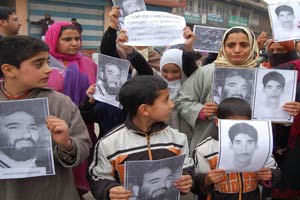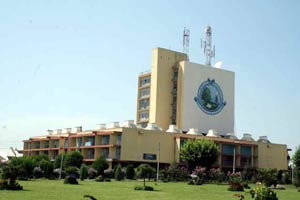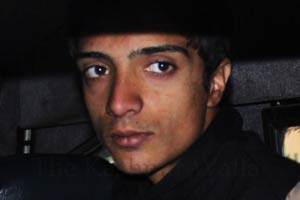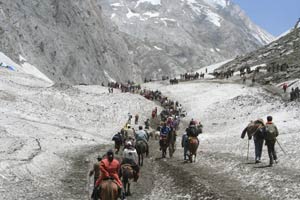Two more life IMPRISONMENT
 After 22 years, a TADA court gave life imprisonment to two JKLF militants Nazir Ahmad Sheikh of Batamaloo and Showkat Ahmad Khan of Nishat, who reportedly have already completed more than 15 years in prison. According to the family, Nazir has already served 14 years in jail in
After 22 years, a TADA court gave life imprisonment to two JKLF militants Nazir Ahmad Sheikh of Batamaloo and Showkat Ahmad Khan of Nishat, who reportedly have already completed more than 15 years in prison. According to the family, Nazir has already served 14 years in jail in
connection with the case. “He was in jail from 1990 to 2002. Then he was rearrested in 2004 and released in 2006. After that he was regularly attending the court,” says his sister.
Voicing concern over this latest verdict, JKLF chief Yaseen Malik called for peaceful protests after Friday prayers and urged people to observe complete strike on December 10.
Malik said it seems that GoI has adopted a new strategy to crush the freedom struggle. “I want to ask the Government of India, especially
Prime Minister of India, Manmohan Singh why were these Kashmiris denied trial for 22 years?,” the JKLF chief questioned.
Malik said fresh strategy of GoI to punish Kashmiris through life sentences has put a question mark on the credibility of Indian Civil
Society. “The Civil Society of India should come clean over the new policy of New Delhi. Otherwise, we would not hesitate to call them a tool used to douse the flames of 1990 in Kashmir on Delhi’s directions as they have adopted a criminal silence over the serious issue of life sentences,” he said. Malik also questioned the silence of international community over the issue. “The international community played an important role in persuading Kashmiris for a non-violent struggle. Their credibility is also at stake now,” he said.
Malik said over the past one-and-a half years Courts in New Delhi have announced 12 life sentences against Kashmiris while J&K Courts have announced nine such sentences. “Similarly, Lucknow and Ajmer courts have announced two life sentences against Kashmiris. It seems GoI feels that by announcing harsh life sentences they would make Kashmiris accept the defeat,” he said. Nazir, a car mechanic, has been sentenced to life imprisonment by a Jammu court in connection with the murder of a BSF officer in 1990. After the murder, Nazir was arrested along with three others – Showkat Ahmed Khan of Nishat, Farooq Ahmed and Farooq Ahmed Mir. While Showkat will serve life imprisonment with Nazir, Farooq Ahmed has been sentenced for five years. Mir is the only person acquitted in the case.
In a decision, which is likely to have ramifications in Kashmir, the Supreme Court of India has asked the state government to go for road widening to Amarnath cave. The latest verdict was given by SC on Wednesday after it asked the Jammu and Kashmir government and Shri Amarnath Shrine Board to broaden the passage leading to holy Amarnath cave and bifurcate it to make separate way for the movement of pedestrian pilgrims and those who go there on horses.
The court took the latest decision while taking suo motu cognizance of media reports on pilgrims’ deaths allegedly due to lack of proper facilities and medical care for them. The apex court had earlier appointed a high-power committee to look into the issue of growing number of casualties of Amarnath pilgrims.
A bench of justices B S Chauhan and Swatanter Kumar asked the state government to give urgent attention to medical, toilet, road and other facilities to the pilgrims and put rubber tiles on the passage near holy caves to prevent pilgrims from slipping on the road.
The court reserved its order after hearing extensive arguments and said that it would pass a detailed order next week. The committee comprises secretaries of various departments including those from the Ministry of Environment and Forest, Home Affairs, Health and Child Welfare, besides the Jammu and Kashmir chief secretary.
The court had asked the committee to visit the shrine and file a report with J&K Governor who is also the chairman of Shri Amarnath Shrine Board, which is responsible for holding the annual Amarnath pilgrimage. About 6.20 lakh pilgrims undertook the Amarnath Yatra this year which saw 93 casualties.
Despite being a state where the prevalence of AIDS is very less, J&K is a potential crisis state because of its mass contact with strangers. Experts says the massive dependence on truckers for getting imports, hosting more than 11 million tourists a year, relying massively on around half a million non-local labor force and finally having stationed nearly half-a-million soldiers makes it an ideal breeding ground for AIDS.
J&K had 3098 confirmed AIDS cases by the end of March 2012. These included 1394 full blown AIDS cases of whom 226 died. According to Performance Review 2012, a publication of the state Health and Family Welfare ministry, there are 808 AIDS patients including 54 children who are receiving free anti-retroviral treatment (ART) in the special centers run by State AIDS Prevention and Control Society (JKSACS).
The review informs that 21701 HIV tests were conducted between April 2011 and December 2011 of which 79 were found reactive. The society has carried out eight rounds of sentinel surveillance. In the last round (November 2008 – January 2009), a total of 7250 random samples were collected of which four samples were HIV+. The last survey carried out in November 2010 is awaiting results.
The society is currently running seven targeted intervention (TI) projects. These include one TI project each in Islamabad, Kathua, Rajouri and two projects each in Jammu and Srinagar, the review report reveals.
In Srinagar, one project is being implemented for intra-venous drug users through NGO FPA of India. Another project for Men-Having-Sex-With-Men (MSM) is being implemented through Peoples’ Social and Cultural Society.
For south Kashmir’s Islamabad, the JKSACS is implementing a TI project for Female Sex Workers which is being implemented through NGO Kashmir Research Institute of Education and Solar Technology. Both the projects in Jammu are for female sex workers (implemented through Himalaya Seva Sung and Shere-i-Sports Club). In Kathua, it is being implemented by Regional Education Society and Society of Environmental Protection and Human Rights is implementing it in Rajouri.
KU FACTFINDING
 The Kashmir University Vice Chancellor is expected to come up with a white paper on all the backdoor appointments which have happened in Varsity over the years.
The Kashmir University Vice Chancellor is expected to come up with a white paper on all the backdoor appointments which have happened in Varsity over the years.
This revelation came in a meeting chaired by Ahmad on Thursday in which heads of departments, directors and deans of faculties underwent through a grilling, as revealed by informed source.
Sources reveal the Varsity is short of Rs 3.2 crore to meet the monthly salary of over 1750 employees and in this month salary to KU employees is yet to release.
“In past the Varsity would use various other funds to clear the salary bill of employees that resulted in mismanagement of funds,” they said.
Earlier, the Varsity’s salary bill used to be around Rs 4 crore per month after the implementation of 6th Pay Commission it mounted to Rs 7.2 crores per month. But the JK Government still eleases just Rs 4 crores. Presently, there is a deficit of Rs 3.2 crores, as per sources.
Meanwhile authorities directed all the officials to handover the official vehicles except Vice Chancellor, Registrar and Controller.
Many say this decision was taken after it was found that departmental vehicles were being misused by officials. “Today’s decision was a decisive one as assistant registrars, HoDs and other officials have been asked to handover the vehicles,” the sources said.
“The decision has angered many officials but it was taken in close consideration between Registrar Prof Zaffar Reshi and V-C Prof Talat Ahmad,” the sources said.
Amnesty KUDOS
Human Right watch dog body Amnesty International hailed the decision of authorities of setting 16 year-old boy Danish Farooq free. Who had been arbitrarily detained in police custody in Srinagar for 16 days.
 “It is a welcome step by the authorities in Jammu and Kashmir,” an e-mailed statement from Amnesty International said.
“It is a welcome step by the authorities in Jammu and Kashmir,” an e-mailed statement from Amnesty International said.
“We are deeply relieved that Danish was released and has been returned to his family, but we know that there are many more cases like his where individuals are locked up on arbitrary grounds or as in Danish’s case, minors detained in regular police custody instead of being provided the safeguards guaranteed by international law to protect minors,” said Raheela Narchoor, Researcher for Amnesty International based in India.
Farooq was first arrested on November 19 under sections 152, 138, 148, and 147 of the Ranbir Penal Code (RPC). All charges relate to
incidents of “stone-pelting.” After three days of arbitrary detention in police custody without any legal grounds, he was produced in court, which ordered his release on bail.
Earlier the watch dog had said that it was deeply concerned that authorities in Jammu and Kashmir arbitrarily detained Farooq and treated him as an adult rather than a child.
Farooq was released on bail at approximately 10:30 pm on December 4 from Khal Krud police station in Srinagar.
His lawyer, Babar Qadri, thanked Amnesty International “For supporting the fight against the abuse of law, and abuse of position by the J&K police. However, much is yet to be done. There are hundreds of cases of human rights abuses in J&K and I hope that Amnesty will consider these cases as well.”
Interestingly, the J&K Juvenile Justice Act, 1997 (JKJJA) defines minors in Jammu and Kashmir as boys 16 years old or younger, and girls18 years old and younger, which is inconsistent with both the national Juvenile Justice (Care and Protection of Children) Act, 2000 and the UN Convention on the Rights of the Child (UN CRC), which India ratified in 1992, to establish laws and procedures specifically applicable to children, and to define minors as all individuals younger than 18.

















